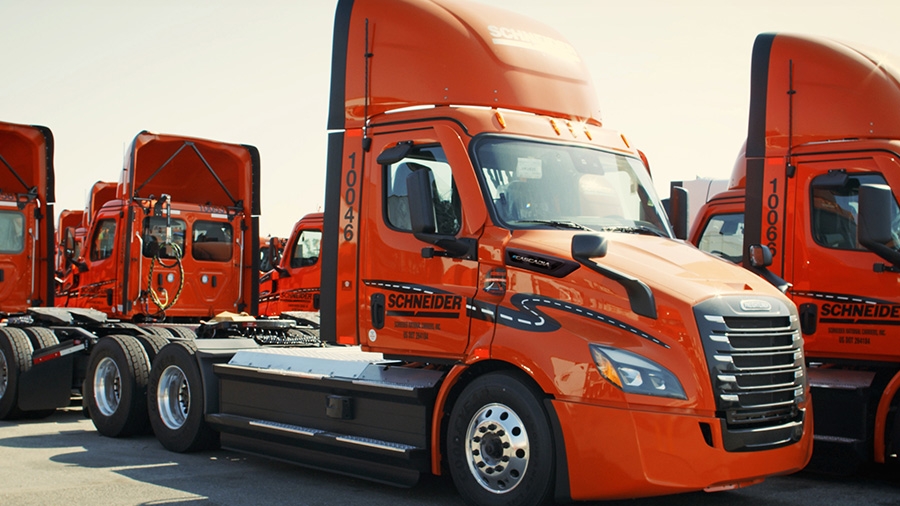One year, 1.5 million zero emission miles and nearly 100 battery electric trucks

Schneider operates one of the largest electric fleets in America
GREEN BAY, Wis. (February 01, 2024) – Over the course of a single year, Schneider National, Inc. (NYSE: SNDR), a premier multimodal provider of transportation, intermodal and logistics services, has achieved significant progress in cleaner transportation solutions, driven by its implementation of zero emission vehicles.
Operating one of the largest battery electric vehicle (BEV) fleets in North America from its Southern California Operations Center, Schneider's nearly 100 BEVs have reached an impressive milestone: they’ve covered over 1.5 million zero emission miles while hauling customer freight in 2023. In doing so, the transportation leader offset approximately 5 million pounds of CO2 emissions. To put this achievement into perspective, it's equivalent to removing over 500 gas-powered cars from the road for a year – a remarkable milestone few carriers have accomplished.
The company's BEV fleet hit the road last January when the first Freightliner eCascadias from Daimler Truck North America arrived in California. Since then, the carrier’s fleet has expanded to a total of 94 electric vehicles, including 92 eCascadias and two electric yard spotters. The eCascadias primarily run drayage routes in and around the Los Angeles area.
Additionally, the company opened a large-scale charging depot at its Intermodal Operations Center in South El Monte. The facility features 16 350 kW dual-corded dispensers that provide charging for Schneider’s BEV fleet and 32 trucks to be charged simultaneously.
Schneider's efforts in sustainability have positioned the company as one of the first carriers to embrace BEVs and exemplify how clean technology can transform the way goods are moved while continuing to deliver on foundational promises of efficiency and reliability for customers. In fact, the company’s electric fleet has already been serving major brands, including Goodyear and Frito-Lay North America.
Feedback from Schneider drivers has also been overwhelmingly positive. Throughout the BEV integration, drivers have shared that it has been easy to acclimate using the vehicles and enjoy the BEV’s ride quality, reduced engine noise and ease of steering.
“Once you drive an electric truck, you won’t want to go back to a diesel truck,” said Schneider Driver Marty Boots.
Growing the BEV fleet is a key aspect of Schneider’s long-term sustainability goal to move goods as efficiently as possible and emit less CO2. The company is well on its way to achieving its 2025 emissions goal of reducing CO2 per mile by 5%, with the goal to reduce CO2 by 7.5% in 2025 and 60% by 2035.
The carrier is consistently recognized by third parties for its leadership to create a more efficient supply chain, including being named a SmartWay Higher Performer by the Environmental Protection Agency and PepsiCo’s Asset Sustainability Carrier of the Year.
To learn more about Schneider’s sustainability initiatives, visit: https://schneider.com/company/corporate-responsibility/sustainability.














